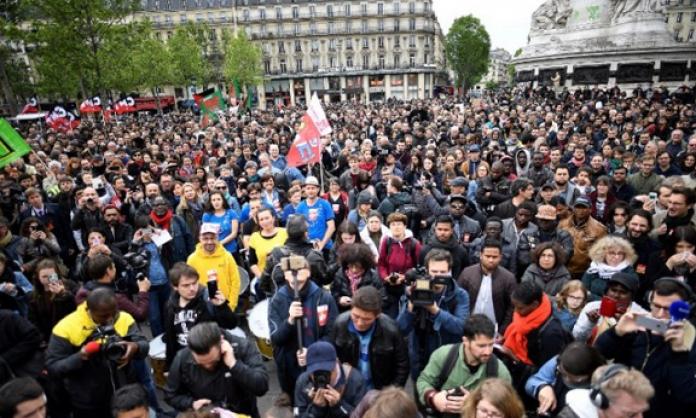Tens of thousands of Parisians took to the streets on 8 May, the first day of Emmanuel Macron’s presidency. The protest was an impressive opening salvo from the left in what is sure to be a bitter struggle against Macron’s neoliberal agenda.
Macron, who tried to present himself during the election as an outsider to the discredited political establishment, was a key economic adviser to François Hollande’s government and a champion of its harshest neoliberal measures.
A former investment banker and product of elite schools, Macron made no secret of his plans to carry through the measures demanded by France’s capitalist class. These include making it easier for bosses to sack workers, attacks on unions, attacks on pensions and retirement entitlements and so on.
Similar attacks led to a mass campaign of strikes and protests last year, which destroyed the ruling Socialist Party and Hollande’s presidency. The protest movement radicalised and organised a new layer of young activists, both inside and outside of the established unions.
The 8 May demonstration was called by a rank and file grouping of communication workers inside the General Confederation of Labour (CGT), the more militant of France’s union confederations that led the fight last year. It was backed by left wing sections of the union movement and the organisations of the left.
These rank and file organisations, often made up of young and radical union delegates, played a crucial role in pushing the movement ahead when union officials dragged their feet or tried to wind things down. They were also a link between the radical youth street movement and the established mass union organisations.
The fact that such networks could mobilise tens of thousands the day after the election, without the official backing of the CGT or other unions is a good sign.
The election result, despite the appalling choices on offer in the final round and the terrible growth of the fascists’ vote, demonstrates the ongoing influence of the left and the potential to build a powerful left wing movement.
As well as left wing candidate Jean-Luc Mélenchon’s 19 percent support in the first round, there was mass abstention by left wing voters who couldn’t bring themselves to support Macron in the second round. Abstention rates were the highest since 1969, and a further 4.2 million voters filled out blank or null ballots – an unprecedented number.
In addition, many people voted for Macron only to stop the fascist Le Pen. Only 19 percent of his voters said they actually support his program. So the new government lacks popular support, despite the very best efforts of the media establishment to portray Macron as a revolutionary saviour of European civilisation.
The new president says that he will rule by decree in order to ram through his unpopular neoliberal measures if he can’t get a majority in parliament. A key question is how many of those who were inspired by and supported Mélenchon, or who abstained on a left wing basis in the second round, can be drawn into an ongoing struggle now the elections are over.
Mélenchon’s orientation seems to be entirely parliamentary and focused on legislative elections next month, so it will be up to other organisations and the unions to make the case for resistance. While getting more left wing representatives elected would obviously be good, they will not be able to stop Macron’s attacks.
The other reason for the left to fight Macron immediately relates to the threat of the far right. The National Front may experience some internal disarray in the coming period due to their vote failing to meet some people’s expectations and the perceived poor performance of Marine Le Pen.
Nevertheless, this should not lull any on the left into complacency. The fascists received 11 million votes and are now trying to establish themselves as “the people’s opposition” to Macron’s neoliberal government. This is, of course, a lie. The National Front’s racism and nationalism are a thoroughly pro-capitalist mix designed to divert the blame for economic insecurity away from the ruling class and the state and onto Muslims, migrants and foreigners.
When the working class and the left are mobilised, all these lies are exposed, as we saw last year in the mass fight against Hollande and Macron’s labour law, which attacked unions, made it easier to sack workers and extended the working week. While hundreds of thousands protested, went on strike and faced down batons and tear gas, the so-called champions of the people in the National Front were proposing even harsher measures, opposing demonstrations and supporting the police.
Macron has promised to deliver an authoritarian neoliberal agenda of attacks on workers, rammed through by decree, accompanied by increased police powers and numbers, and an even more intensified “security” regime of a never-ending declared state of emergency, border guards and surveillance.
The fight ahead for workers and oppressed minorities will be bitter and hard-fought. But Monday was a very good beginning and demonstrated the potential to build a mass, radical and victorious resistance.










